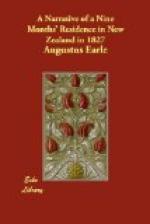Indian corn was likewise very abundant, but as the natives did not possess any means or knowledge of grinding it, they were not aware of its full value. Their only method of cooking it was one very disgusting to Europeans. They soaked the ear in water till it was quite soft and sour, the smell from which was exceedingly offensive; they then placed it in their earth ovens to bake, and when they partook of it they seemed to enjoy it very much.
In one of my journeys across the island I was accompanied by my Scotch friend, Mr. Shand, who prided himself very much upon his general knowledge of agricultural pursuits; and when I indulged in some sudden bursts of admiration at the beauty of the surrounding prospect, he would invariably check my enthusiasm, by observing that no animals could possibly live in a country so overgrown with fern, and where no grass was indigenous. These observations, often repeated, obliged me to qualify my admiration of this picturesque and beautiful land; but my surprise, and I may say my triumph, were complete when, on approaching the missionary village of Kirikiri, we fell in with a herd of at least a hundred fat cattle, browsing on the sides of the hill, and having nothing else but this very fern to eat; and, on inquiry, we found they gave as good milk, and were in as healthy a condition, as when they grazed on the rich grasses of Lincolnshire.
My friend, Captain Duke, made great preparations for the return of his ships, and purchased many pigs to be salted. The self-denial of the natives is wonderful: though very fond of animal food, they sell the whole to us Europeans for the means of war; thus conquering the appetite for the purpose of possessing arms to make them terrible in the sight of their enemies. This feeling, properly directed, may lead to their becoming a great nation. In the course of our saltings and picklings of pork, owing to the warmth of the weather, a considerable quantity was spoiled. I recommended its being immediately thrown into the sea, but Duke, who knew the propensities of the people better than I did, and wished to ingratiate himself among them, sent for some of his favourites, and presented them with the damaged meat, with which they marched off highly delighted, and made a public feast of it in the evening.
[Illustration: New Zealand Method of Tattooing. (From a sketch by A. Earle.)]
CHAPTER XXXII.
The art of tattooing.
The art of tattooing has been brought to such perfection here, that whenever we have seen a New Zealander whose skin is thus ornamented, we have admired him. It is looked upon as answering the same purposes as clothes. When a chief throws off his mats, he seems as proud of displaying the beautiful ornaments figured on his skin as a first-rate exquisite is in exhibiting himself in his last fashionable attire. It is an essential part of war-like preparations. The whole of this district of Kororarika was preparing for the approaching war. Their canoes, muskets, powder and balls, increased daily; and a very ingenious artist, called Aranghie, arrived to carry on this important branch of his art, which was soon placed in requisition, for all the mighty men in the neighbourhood were one by one under his operating hands.




